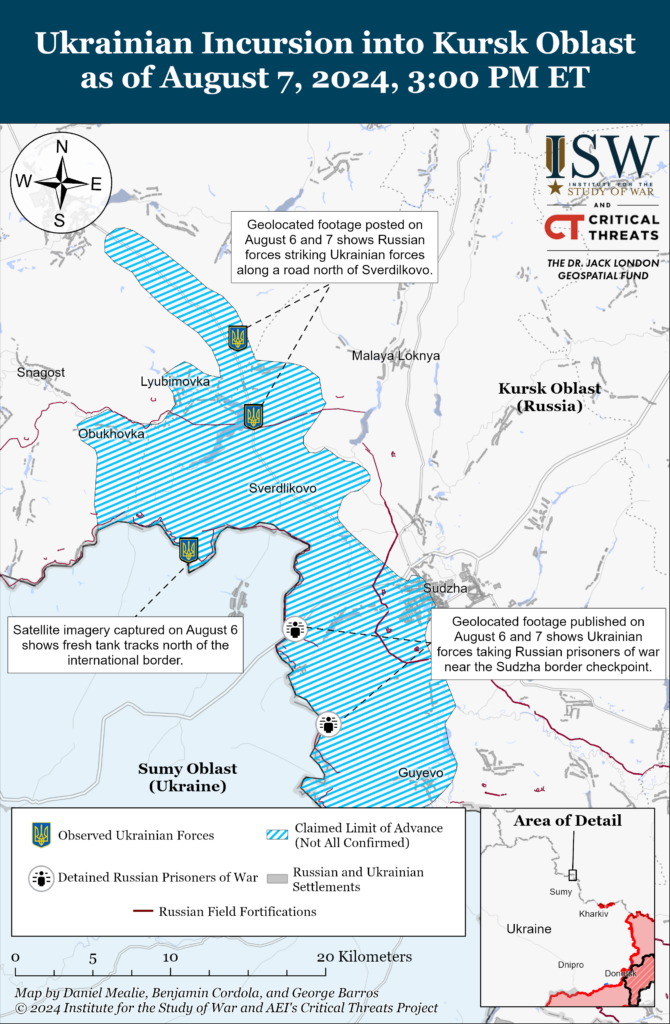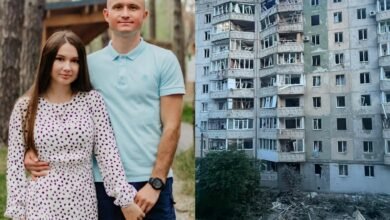
Ukrainian forces have reportedly been advancing into Russia’s Kursk Oblast for three days, yet Kyiv maintains official silence.
Footage circulating on Telegram channels appears to show regular Ukrainian Armed Forces units conducting the offensive, equipped with armored vehicles, air defense systems, artillery, and standard weaponry.
Russian sources claim Ukrainian forces have not only breached the border but established a foothold in Russian territory. The American Institute for the Study of War (ISW) reports that Ukrainian troops have advanced at least 10 kilometers into the Kursk Oblast.
Amidst the official silence, Mykhailo Podoliak, an advisor to the Ukrainian President’s Office, offered the sole commentary from the Ukrainian side. He suggested that operations like this could positively influence future negotiations with Russia.
Recent operations in Russia’s Kursk region may strengthen Ukraine’s position in future talks, says Ukrainian presidential advisor Podolyak.
He remains the sole Ukrainian official commenting on the 3-day border incursion. pic.twitter.com/jtZzOf0Yqh
— Euromaidan Press (@EuromaidanPress) August 8, 2024
“Russia will only negotiate seriously when they realize the war isn’t going according to their plan,” Podoliak stated on Ukrainian television.
Euromaidan Press sought expert opinions on whether the Ukrainian operation in Russia’s Kursk Oblast is strategically linked to future peace negotiations.
What is going on in Russia’s Kursk Oblast?
On Monday night, Russia’s Kursk Oblast was attacked by drones, with local authorities reporting that they shot down 26 fixed-wing drones over the area. That same night, the district center of Sudzha, located just 10 kilometers from the Russian-Ukrainian border, came under fire.
By the following morning, reports began to emerge about armed groups breaking through at several points along the border and engaging in battles in the border zone. These events bore similarities to incursions carried out in 2023 and 2024 by volunteer battalions comprising Russians fighting for Ukraine, such as the Russian Volunteer Corps and the Freedom of Russia Legion.
🇬🇪🇺🇦 | Day 3 of Georgian and Ukrainian fighters participating in the Kursk incursion operation. pic.twitter.com/9cVyZtiB7E
— Visioner (@visionergeo) August 8, 2024
However, the current incursion appeared to be on a larger scale, with the presence of armored vehicles and clear coordination between the advancing units along different routes. This suggested a more organized and substantial operation compared to previous cross-border raids.
Russian official sources provided conflicting accounts of the situation. Some claimed the Ukrainian raid had been suppressed, while others insisted that the fighting continued.
On the morning of 7 August, it became clear that battles were indeed ongoing, with influential bloggers reporting that the Ukrainian Armed Forces had captured 11 settlements. The city of Sudzha was either surrounded or already under Ukrainian control.

As of 8 August, the situation in the Kursk Oblast remained unclear. Ukrainian authorities and military officials maintained their silence, while Russian Telegram channels reported that fighting was taking place 26 kilometers from the border, with the town of Sudzha reportedly under Ukrainian control.
Unconfirmed reports also suggested that remnants of the Wagner group fighters, who had been in Africa, were being urgently deployed to the Kursk Oblast.
Sudzha is key to Europe’s energy chessboard
From a military perspective, Sudzha is a crucial logistical point, as it’s located near a railway that Russians use to supply their front in northern Kharkiv Oblast. However, its significance extends beyond this.
Unconfirmed reports suggest that Ukrainian forces have seized control of the Sudzha gas metering station, a critical component of the last remaining pipeline transporting Russian gas to Europe via Ukraine. The station’s capture could have far-reaching consequences for European energy markets.
On 8 August, the Ukrainian Gas Transmission System Operator reported a decrease in Russian gas transit through Ukraine to 37.25 million cubic meters, down from the usual 42-42.4 million. This reduction coincided with reports of Ukrainian troops seizing the Sudzha gas intake point.
The news had an immediate impact on European gas prices. Bloomberg reported that benchmark futures rose 4.8% to €38.45 per megawatt-hour, the highest since December.
“While Europe has made efforts to wean itself off piped Russian gas since the war, a potential cut to supplies would still be a shock, pushing up prices for consumers and industry,” Bloomberg wrote.
The Ukrainian advance also puts them halfway to the Kursk Nuclear Power Plant in nearby Kurchatov. This proximity has sparked speculation about a potential Ukrainian plan to capture the Kursk NPP, possibly to negotiate an exchange for the Zaporizhzhia NPP, Europe’s largest power plant occupied by Russia in 2022.
“Reclaiming the Zaporizhzhia NPP would be a game-changer, restoring 30% of our pre-war electricity. It’s an ideal but unlikely scenario,” Ukrainian analyst Viktor Andrusiv stated on Telegram.
Defense expert Mykhailo Samus echoes this sentiment, dismissing such speculations.
“All of this is still at the level of fantasy with varying degrees of creativity,” he told Euromaidan Press.
Is this really about potential talks?
Mykhailo Samus believes it’s too early to evaluate the goals of the Ukrainian offensive in Kursk.
However, he suggests “this is an attempt to turn the tide of the war and seize the strategic initiative. Logically, there should be other actions on other fronts as well.”
Regarding the potential for improving Ukraine’s position before hypothetical negotiations, Samus believes the time for that has not yet come.
“It’s too early to talk about negotiations, except perhaps negotiations between Zelenskyy and the new US president about a further strategy to destroy Russia,” he says.
In contrast, Dmytro Shulha of the Renaissance Foundation supports improving Ukraine’s position before negotiations. Paraphrasing Clausewitz, Shulha wrote that “war is the continuation of negotiations by other means.”
“Suddenly, Russians are concerned about nuclear plant safety and civilian shelling. Watch as they soon worry about energy security from refinery strikes, and maritime security from port attacks. At this rate, they might even consider the 1991 borders [of Ukraine] as part of a ‘just peace’ formula,” he wrote on Facebook.
Security analyst Jimmy Rushton argues a successful Ukrainian operation in Kursk Oblast would make it harder for Russia to freeze the conflict.
“If Ukraine is occupying Russian territory, it makes any attempt by Moscow to “freeze the conflict along the current lines of control” – something they’ve been back-channeling they would accept for a while – far more complicated,” he wrote on X/Twitter.
Ukrainian aerial reconnaissance specialist Oleksandr Karpiuk believes the Kursk operation disrupted the Russian offensive in Ukrainian Sumy Oblast.
“Ukrainian forces entered Kursk Oblast to create a buffer zone, preempting attacks on Sumy. This distracts the enemy, buying Ukraine time while Russia focuses air power on its own territory,” he wrote on Facebook.
Former Ukrainian Defense Ministry advisor Oleksiy Kopytko sees the Kursk operation as part of defending Kharkiv.
“The operation is limited so far, but it’ll weaken Russian forces near Kharkiv. Their reserves intended for Kupiansk and the Kharkiv-Sumy gap will be depleted on the ‘Kursk front’ instead,” the expert wrote on Facebook.
Green light from the West
Western allies have rallied behind Ukraine’s recent military action, showcasing a united front. The US, while not informed beforehand of the Kursk operation, seeks details and supports Ukraine’s “common sense” defensive measures.
US State Department spokesman Matthew Miller dismissed Moscow’s condemnations of the Ukrainian attack.
“I have seen the statements from the Russian government. It is a little bit rich, them calling it a provocation, given Russia violated Ukraine’s territorial integrity and sovereignty,” he told a briefing.
European support echoes this sentiment.
The European Commission’s Peter Stano reaffirmed Ukraine’s right to self-defense, asserting: “Ukraine has the legitimate right to defend itself, including striking the aggressor on its territory.”
Germany took a significant step by allowing German-supplied weapons to be used within Russian borders.
“Due to Russia’s attack on Ukraine, the territory of both states is a combat zone. The use of weapons falls under the provisions of international law,” Bundestag defense committee chair Markus Faber explained.
This applies to “all armaments,” including the advanced Leopard 2 tanks.
Ukrainian Kursk incursion reveals Russia’s systemic weaknesses
Ukrainian incursion into the Kursk Oblast caught many, including the Russian command, by surprise, according to Ukrainian OSINT-analyst Tatarigami.
“The operation’s skillful planning is evident. Russia failed to assemble an adequate rapid response force and misread Ukraine’s intentions, despite extensive ISR capabilities over the frontlines and even deep into Ukrainian territory,” Tatarigami told Euromaidan Press.
This bold move challenges concerns over escalation that previously limited Ukraine’s use of ATACMS and similar systems in Russian territory. Despite the direct threat to Russia’s territorial integrity, no nuclear retaliation has occurred.
The operation also exposes Russia’s persistent inability to respond swiftly to battlefield developments, a weakness first seen during the 2022 Kharkiv counter-offensive. This stems from over-centralized control and concentrated decision-making, hampering quick responses.
“This incursion has rekindled hope and optimism in Ukraine and the West, countering the perception of a static battlefield where Ukraine was slowly losing ground,” Tatarigami added, highlighting the operation’s impact on morale and strategic perceptions.
Read more:




